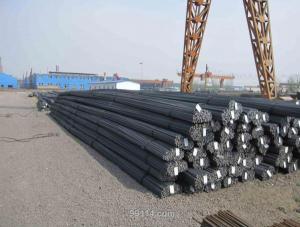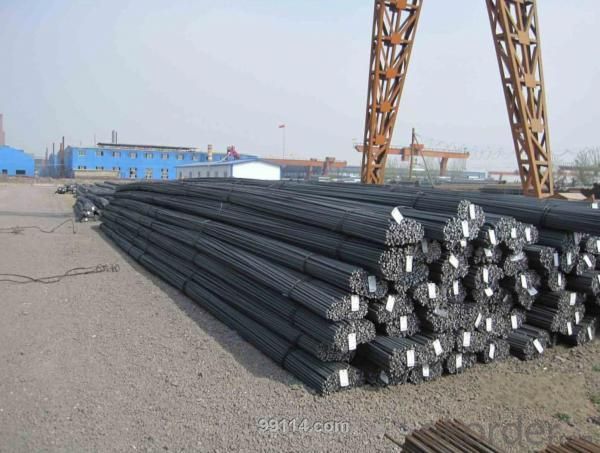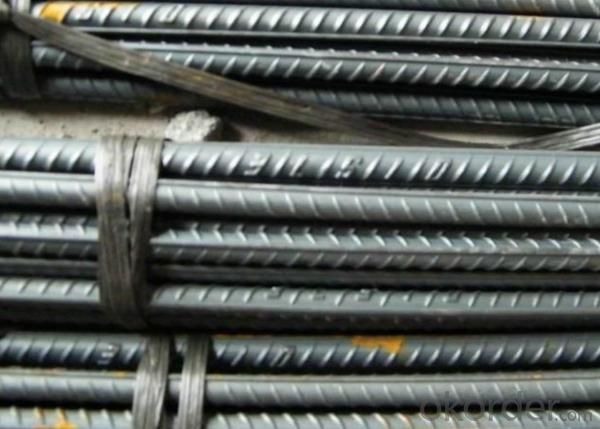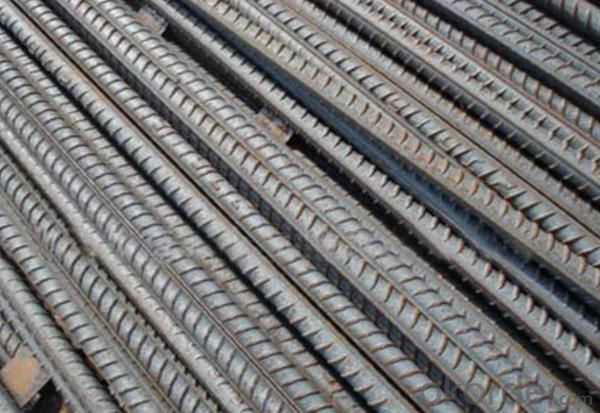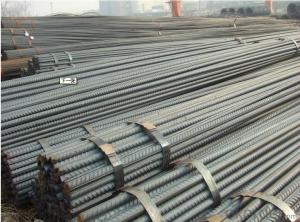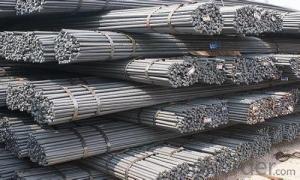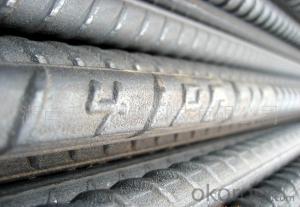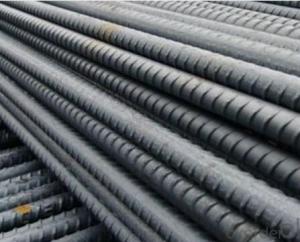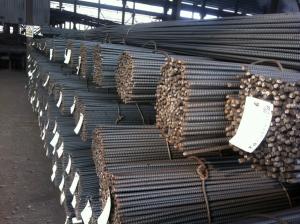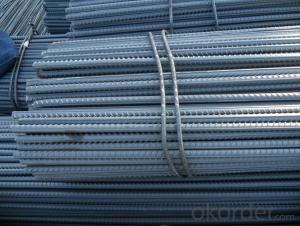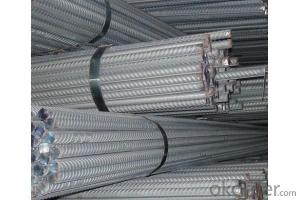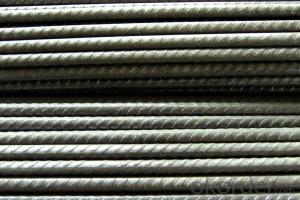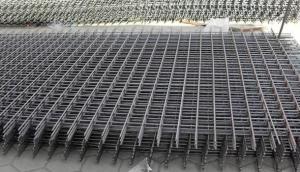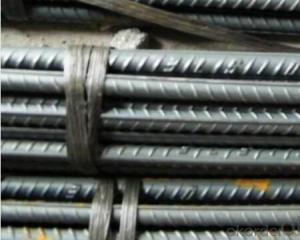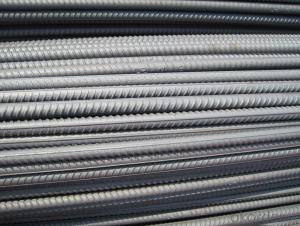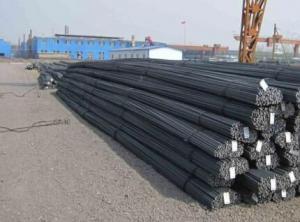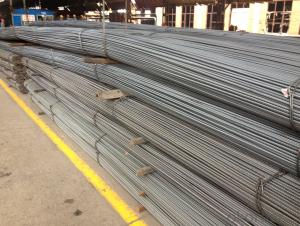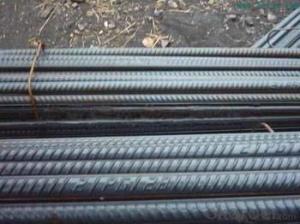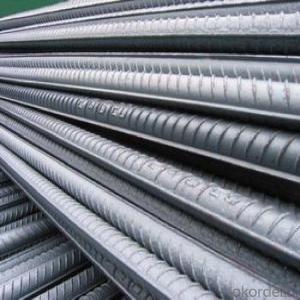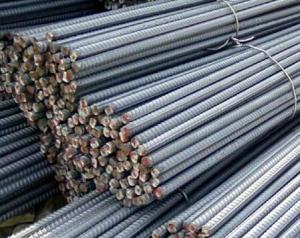High Quality Deformed Steel Rebars
- Loading Port:
- China Main Port
- Payment Terms:
- TT or LC
- Min Order Qty:
- 25MT m.t.
- Supply Capability:
- 800000tons/year m.t./month
OKorder Service Pledge
OKorder Financial Service
You Might Also Like
Specifications of High Quality Deformed Steel Rebars:
Standard | GB UK USA | HRB335 HRB400 HRB500 G460B, B500A, B500B,B500C GR40, GR60 | |
Diameter | 6mm,8mm,10mm,12mm,14mm,16mm,18mm,20mm, 22mm,25mm,28mm,32mm,36mm,40mm,50mm | ||
Length | 6M, 9M,12M or as required | ||
Packing | Export standard packing: wrapped by wire rod in bundles | ||
Each bundle weight | 2-3MT, or as required | ||
Trade terms | FOB, CFR, CIF | ||
Payment terms | TT payment in advance or Irrevocable LC at sight. | ||
Delivery Detail | within 45 days after received advanced payment or LC. | ||
Brand name | DRAGON | ||
Theoretical weight and section area of each diameter as below for your information:
Diameter(mm) | Section area (mm²) | Mass(kg/m) | Weight of 12m (kg) | Pcs/ton |
6 | 28.27 | 0.222 | 2.664 | 375.38 |
8 | 50.27 | 0.395 | 4.74 | 210.97 |
10 | 78.54 | 0.617 | 7.404 | 135.06 |
12 | 113.1 | 0.888 | 10.656 | 93.84 |
14 | 153.9 | 1.21 | 14.52 | 68.87 |
16 | 201.1 | 1.58 | 18.96 | 52.74 |
18 | 254.5 | 2.00 | 24 | 41.67 |
20 | 314.2 | 2.47 | 29.64 | 33.74 |
22 | 380.1 | 2.98 | 35.76 | 27.96 |
25 | 490.9 | 3.85 | 46.2 | 21.65 |
28 | 615.8 | 4.83 | 57.96 | 17.25 |
32 | 804.2 | 6.31 | 75.72 | 13.21 |
36 | 1018 | 7.99 | 98.88 | 10.43 |
40 | 1257 | 9.87 | 118.44 | 8.44 |
50 | 1964 | 15.42 | 185.04 | 5.40 |
Chemical Composition: (Please kindly find our chemistry of our material based on JIS as below for your information)
JISG3112 SD390 | Chemical Composition | ||||
C | Mn | Si | S | P | |
0.22 | 1.38 | 0.4 | 0.014 | 0.022 | |
Physical capability | |||||
Yield Strength(N/cm²) | Tensile Strength(N/cm²) | Elongation (%) | |||
620 | ≥400 | 21 | |||
The production process of Steel Rebar

1-Waling beam furnace 2-Roughing rolling group 3-Intermediate rolling train
4-Finishing rolling group 5-Water-cooling device 6-Walking beam cooler
7-Finishing equipment(including the cold scale shear,short feet collection system,
automatic counting device,bundling machine, collect bench)
Usage and Applications of High Quality Deformed Steel Rebars:
Deformed bar is widely used in buildings, bridges, roads and other engineering construction. Big to highways, railways, bridges, culverts, tunnels, public facilities such as flood control, dam, small to housing construction, beam, column, wall and the foundation of the plate, deformed bar is an integral structure material. With the development of world economy and the vigorous development of infrastructure construction, real estate, the demand for deformed bar will be larger and larger..
Packaging & Delivery of High Quality Deformed Steel Rebars:
Packaging Detail: products are packed in bundle and then shipped by container or bulk vessel, deformed bar is usually naked strapping delivery, when storing, please pay attention to moisture proof. The performance of rust will produce adverse effect.
Price: Keep lower operating costs so as to offer competitive price for our clients
Deformed Steel Rebars according to Korean standard
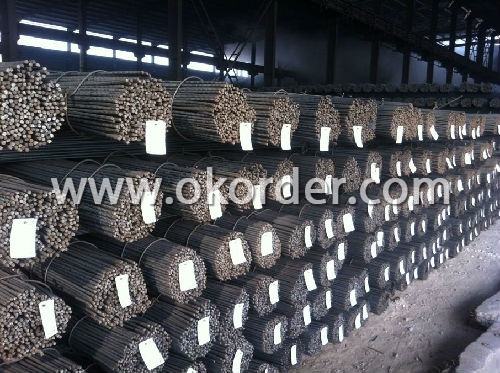
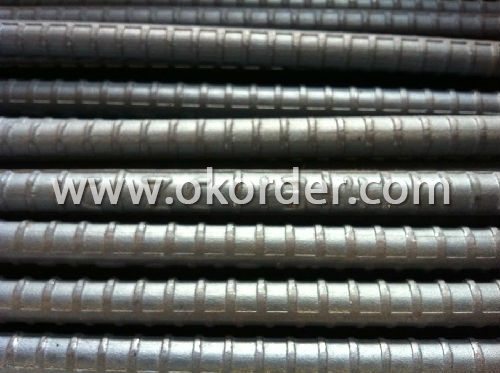
Note:
1. Our products are produced according to national standard (GB), if not, supply according to national standards (GB) or agreement as customer required.
2. Other Grade and Standard Deformed Steel Bar we can supply:
Grade: GR40/GR60, G460B/B500A/B500B/B500C,BST500S
Standard: ASTM, BS, DIN
The Minimum Order Quantity of these products is high, and need to be confirmed.
3. We can not only supply Deformed Steel Bar; if you need anything about building materials, please contact us for further information.
4. Please send us your detail specifications when inquire. We will reply to you as soon as possible. We sincerely hope we can establish a long stable business relationship.
- Q: Can steel rebars be used in the construction of residential communities?
- Yes, steel rebars can be used in the construction of residential communities. Steel rebars provide strength and durability to reinforced concrete structures, making them suitable for a wide range of construction projects, including residential buildings. The use of steel rebars helps ensure the structural integrity and longevity of the buildings, making them a reliable choice for residential communities.
- Q: How do steel rebars affect the overall weight of a concrete structure?
- Steel rebars typically increase the overall weight of a concrete structure. This is because steel rebars add additional mass to the concrete, making it heavier. However, the weight increase is generally proportionate to the added strength and durability that the rebars provide, making them essential for reinforcing the structure and improving its structural integrity.
- Q: What are the factors that determine the selection of steel rebars?
- There are several factors that determine the selection of steel rebars for construction projects. One of the most important factors is the required strength and durability of the structure. Different grades of steel rebars have different yield strengths, which indicate the maximum amount of stress the rebar can withstand before it begins to deform. The design of the structure and the load it will bear will determine the required strength of the rebars. Another factor is the corrosion resistance of the rebars. Steel rebars are susceptible to corrosion, especially when exposed to moisture and other environmental factors. In areas with high humidity or near coastal regions, corrosion-resistant rebars may be required to ensure the longevity and structural integrity of the project. The size and shape of the rebars also play a role in their selection. The diameter of the rebar is determined by the structural requirements and the concrete cover thickness. The shape of the rebar, whether it is plain, deformed, or ribbed, also affects its bonding with the surrounding concrete. The availability and cost of the rebars are important factors as well. Some grades or types of steel rebars may be more readily available in certain regions, while others may need to be imported. The cost of the rebars will also influence the selection, as different grades and types may have varying price points. Lastly, the specifications and requirements set by local building codes and regulations must be considered. These codes often dictate the minimum standards for strength, corrosion resistance, and other factors that must be met by the rebars used in construction. Overall, the factors that determine the selection of steel rebars include required strength, corrosion resistance, size and shape, availability and cost, and compliance with local building codes and regulations. By considering these factors, engineers and construction professionals can select the most suitable rebars for their projects to ensure safety, durability, and cost-effectiveness.
- Q: What is the content ratio of the screw steel and manganese steel?
- Steel: content index mainly includes: C, Mn, P, S, Si, different grades, different content, its range is C (0.10 ~ 0.40%), Mn < 1.80%, P < 0.050%, S < 0.050%, Si (0.60 ~ 1%).
- Q: Are steel rebars suitable for use in foundation structures?
- Yes, steel rebars are suitable for use in foundation structures. Steel rebars, also known as reinforcing bars, are commonly used in concrete construction to provide strength and reinforcement to the structure. The use of steel rebars in foundation structures helps to increase the load-bearing capacity and durability of the foundation. Steel rebars are made from steel, which has high tensile strength and is resistant to corrosion, making it an ideal material for use in foundation structures. The rebars are placed in the concrete during construction, providing additional strength and preventing cracks or fractures in the foundation. They help to distribute the load evenly throughout the foundation, reducing the risk of settlement or failure. Furthermore, steel rebars can be easily customized to meet the specific requirements of the foundation structure. They come in various sizes, shapes, and grades, allowing for flexibility in design and construction. This versatility makes steel rebars suitable for use in different types of foundation structures, including residential, commercial, and industrial buildings. Overall, steel rebars are a reliable and cost-effective choice for reinforcing foundation structures. They enhance the structural integrity and longevity of the foundation, ensuring a solid and stable base for the entire building.
- Q: Are steel rebars resistant to chemicals?
- Steel rebars are typically resistant to chemicals. Steel is renowned for its strength and durability, enabling it to endure exposure to various chemicals without significant deterioration. However, the level of resistance may vary based on the specific chemical, concentration, and duration of exposure. Generally, steel rebars exhibit high resistance to commonly found construction materials and environments, including water, concrete additives, and standard cleaning agents. They also withstand acids, alkalis, and organic solvents. Nevertheless, aggressive chemicals like strong acids or oxidizing agents can lead to corrosion or damage over time. Therefore, it is crucial to consider the chemical environment when choosing and utilizing steel rebars, and implement appropriate safeguards if necessary, such as protective coatings or corrosion inhibitors.
- Q: What is the impact strength of steel rebars?
- The impact strength of steel rebars can vary depending on several factors such as the composition of the steel, the manufacturing process, and the specific grade of the rebar. However, in general, steel rebars are known for their high impact strength. This means that they are able to withstand significant forces and impacts without fracturing or breaking. Steel rebars are commonly used in construction projects to reinforce concrete structures and provide additional strength. Their high impact strength allows them to withstand heavy loads, vibrations, and even extreme weather conditions. The impact strength of steel rebars is crucial in ensuring the structural integrity and safety of buildings and infrastructure. They play a critical role in preventing buildings from collapsing under stress, such as earthquakes or heavy loads. Additionally, steel rebars can absorb and distribute the impact energy throughout the structure, reducing the likelihood of localized damage. Overall, the impact strength of steel rebars is a key factor in determining their suitability for various applications in construction. Engineers and architects carefully consider this property when selecting the appropriate grade and size of steel rebars to ensure the durability and safety of the structures they design.
- Q: Are steel rebars suitable for use in aggressive environments?
- Steel rebars are indeed suitable for use in aggressive environments. Steel rebars are commonly used in construction projects, particularly in reinforced concrete structures, due to their high tensile strength and durability. However, in aggressive environments where the rebar is exposed to corrosive elements such as moisture, chloride ions, and chemicals, corrosion can occur, weakening the rebars and compromising the structural integrity of the concrete. To combat this issue, steel rebars are often coated with protective materials like epoxy or zinc to provide a barrier against corrosion. Additionally, stainless steel rebars are also used in aggressive environments due to their superior corrosion resistance properties. In conclusion, while steel rebars are generally suitable for use in aggressive environments, it is crucial to consider the specific conditions and ensure appropriate protective measures are taken to prevent corrosion and maintain the longevity of the reinforced concrete structure.
- Q: How do steel rebars affect the overall structural stability of a building?
- Steel rebars significantly enhance the overall structural stability of a building. By reinforcing concrete, rebars increase its tensile strength and prevent cracking and failure under heavy loads or external forces. This reinforcement ensures that the building can withstand various stresses, such as earthquakes, wind, and vibrations, improving its durability and safety.
- Q: Can steel rebars be used in the construction of sports stadiums or arenas?
- Certainly, the utilization of steel rebars in the construction of sports stadiums or arenas is a viable option. These rebars are frequently employed as reinforcement in concrete structures due to their impressive tensile strength and durability. Their suitability for extensive projects, such as sports stadiums, is evident. By providing extra support and stability, the rebars enable the concrete to withstand the immense loads and forces that occur during events in stadiums and arenas. Moreover, the versatility of steel rebars allows for effortless shaping and bending to match the specific design requirements and needs of the structure, making them an adaptable choice in construction endeavors.
1. Manufacturer Overview
| Location | Hebei, China |
| Year Established | 2009 |
| Annual Output Value | Above US$ 500 Million |
| Main Markets | Southeast Asia; East Asia; Middle east |
| Company Certifications | ISO 9001:2008 |
2. Manufacturer Certificates
| a) Certification Name | |
| Range | |
| Reference | |
| Validity Period |
3. Manufacturer Capability
| a) Trade Capacity | |
| Nearest Port | Tianjin; |
| Export Percentage | 40%-60% |
| No.of Employees in Trade Department | 21-60 People |
| Language Spoken: | English; Chinese |
| b) Factory Information | |
| Factory Size: | Above 850,000 square meters |
| No. of Production Lines | Above 5 |
| Contract Manufacturing | OEM service offered |
| Product Price Range | high; average |
Send your message to us
High Quality Deformed Steel Rebars
- Loading Port:
- China Main Port
- Payment Terms:
- TT or LC
- Min Order Qty:
- 25MT m.t.
- Supply Capability:
- 800000tons/year m.t./month
OKorder Service Pledge
OKorder Financial Service
Similar products
Hot products
Hot Searches
Related keywords
